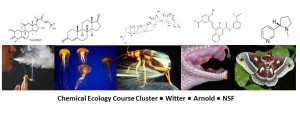 New greenhouse, lab, and office facilities on the way……
New greenhouse, lab, and office facilities on the way……
Dickinson College has received a $1 million gift from alumni John ’59 and Inge Paul Stafford ’58 to fund a new research-quality greenhouse on the grounds of Kaufman Hall. The greenhouse is expected to have a transformative effect on sustainability education, interdisciplinary learning and the college’s science curriculum. see more at: https://www.dickinson.edu/giving/news/
The Rector Science Complex addition will unite the biology department with Dickinson’s other science departments. The new space will provide additional state-of-the-art facilities and more opportunities for interdisciplinary collaboration across the sciences. see more at: http://www.dickinson.edu/news-and-events/Rector-Science-Complex-Addition/
NSF-sponsored CHEMICAL ECOLOGY problem-based learning course at Dickinson. This marks our second year teaching this interdisciplinary course to biology, chemistry, and biochemistry and molecular biology students. Currently we are learning extraction, HPLC, and GC-MS analysis methods for diterpenes and will soon be moving on to work with small phenolics in grape and wine and examine the impacts of alkaloids on animal physiology.
Matt Steiman, Assistant Director at the Dickinson Farm plots the locations of cucurbits, with Profs. Amy Witter (chemistry) and Tom Arnold (biology). Students harvest plant tissues for the extraction of diterpene natural products that are deterrents for generalist pests but strong attractants and feeding stimulants for cucumber beetles.


Leave a Reply